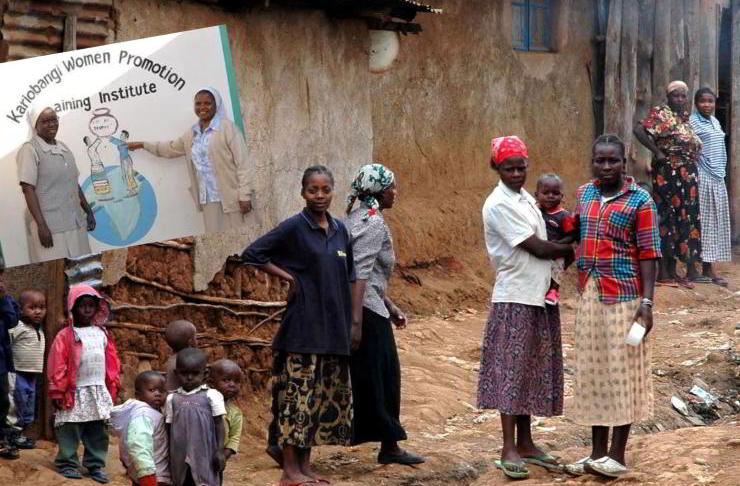The Kariobangi Women Promotion Training Institute helps young women by giving them skills in tailoring, dressmaking, hairdressing and catering. The Comboni Missionary Sisters have been running the project since 1992.
The roar of welding machines, the shouts of mechanics working in a garage, motorcyclists, small shops selling motorcycle parts and second-hand clothes, and food vendors along the busy Outer Ring Road welcome you to the mid-morning bustle of Kariobangi, a sprawling low-income settlement in Eastlands, Nairobi.
At the heart of this daily hustle and bustle is the Kariobangi Women Promotion Training Institute, located in the compound of the Holy Trinity Catholic Church. The Kariobangi Women Promotion Training Institute (KWPTI), run by the Comboni Missionary Sisters, helps young women in the low-income areas of Kariobangi, Korogocho, Kariadudu, Huruma, Ngei and Kariobangi South by providing them with skills in tailoring, dressmaking, hairdressing and catering.
A child care centre on the first floor of the two-story building that houses the Kariobangi Women Promotion Training Institute is a vital part of the project. The centre takes care of babies so their mothers are free to attend classes.
Sister Mary Kevin Avaro, the executive director of the Kariobangi Women Promotion Training Institute, said: “If you don’t take care of the child, the mother will not come.”
In the 90’s, the Holy Trinity Catholic Parish of Kariobangi started the project to enable the women to support themselves. In 1992, the Comboni Missionary Sisters took over the project. They started with courses in tailoring, beadwork and knitting. The sisters also introduced life skills classes, including character development, spiritual formation and counselling, and basic business and computer skills.
Today, the Kariobangi Women Promotion Training Institute is recognized by the Technical and Vocational Educational and Training Authority, or TVETA, offering courses in fashion and design, food and beverage production, and hairdressing and beauty therapy.
The institute also provides grooming services to make students feel comfortable being with others, as well as tea every day because some arrive hungry. A social worker visits their homes to know where they come from and to assess their situation. “You may think that they don’t want to pay school fees, then you realize there is a problem,” Avaro said. “By tradition, we don’t send them home.”
Twenty-one-year-old Lynn Chepng’eny and 22-year-old Scovia Nakato, fashion and design graduates, are beneficiaries of the institution. Together, they have started a dressmaking business. Although the business has started slowly, Nakato believes it will catch up. “That is God because we had no hope. I would like to thank the Sisters for helping girls, and I pray they help others, too. May God bless them,” Nakato said.
Scovia Miriam, a married student with two children from Korogocho said: “When I came, I thought I was the only one going through hardship, but I found others, and that gave me the psych to go on,” Miriam said. “The Sisters treated us with respect like we are people’s children.”
Those who run the school said it is challenging to run the project because of the costs, including providing equipment and materials that students need. And the tuition is lower than other colleges.
To support the project, the school runs a production unit that produces clothes, uniforms, game kits, and tie-dye products, which are then sold to the public to help subsidize the costs of running the school. The production unit has employed former students at the institution and often brings in the students to help with the production when the orders placed are large.
After the training, some students work in the local markets, some open their own businesses, and others are employed by the school as trainers or work in the production unit.
Mwangi Kuria, a teacher at St. John’s School in Kariobangi said, “KWPTI has done a lot. There are students who after high school could not progress because of poverty but then joined the project, and the training changed their lives.”
“They become independent and very productive. Our girls have gone through training and are now working in big hotels, or the Export Processing Zone [EPZ], or they have their own salons, so they are becoming mentors to those growing up,” she added.
As to whether the Kariobangi Women Promotion Training Institute has achieved its purpose of starting a project that would enable the girls to support themselves, Avaro said, “I think we have achieved a lot with this institution because many women have been supported.” (Text & Photo: Lourine Oluoch)






